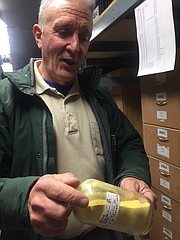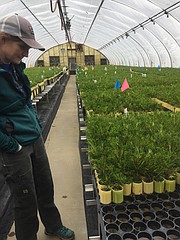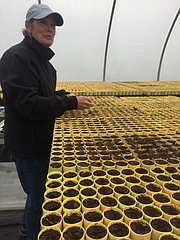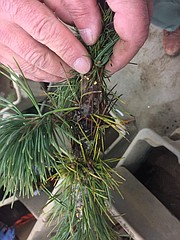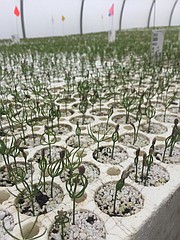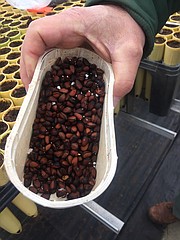SEED CITY
Forest nursery in Cd’A serves serious seed purpose
The Idaho Panhandle National Forests Nursery in Coeur d’Alene produces more whitebark pine seedlings than any other facility in the country.
Throughout the Rocky Mountain region, whitebark pine trees grow in the highest elevation forests and at timberline from Alberta to Wyoming. The seeds provide critical food for Clark’s nutcrackers and grizzly bears.
In the course of one season, the Coeur d’Alene nursery produces 300,000 whitebark pine seedlings, largely sown by Yvonne Holman. In a warm greenhouse under a gray April sky, Holman estimated she had already sown 200,000 seeds by hand.
“The seeds are the size of a small almond,” said Emily Rhoades, horticulturist and greenhouse manager.
Nursery superintendent Aram Eramian leads the fight against blister rust. Like western white pines, whitebark pines are especially susceptible to the non-native fungal pathogen, brought to Idaho by infected spores in the early 1900s. Blister rust requires two diverse hosts to complete its life cycle and also infects ribes plants — gooseberries and currants.
Less than 5 percent of western white and whitebark pine populations have genetic resistance to blister rust. The nursery works to propagate rust-resistant varieties of whitebark pine, through cloning and seed collection.
“We are the only nursery in the system that grows in this volume of whitebark pine,” Eramian said.
Foresters throughout the region gather whitebark pine cones to send to the nursery. The cones are identified and stored in a mammoth barn with tongue and groove white pine ceilings. Here the cones are heated to 105 degrees Fahrenheit using kilns.
“This flares the scales so we can shake the seeds out,” Eramian said.
The process mimics summer heat waves in a natural setting. The cone trays are then dumped into a hopper to separate the seed wings and cone matter from the seeds. With new technology, the nursery uses a digital X-ray machine to ensure seeds are viable before further processing them.
Two hefty gray cats, Pi and Smokey, keep watch over the seed room as the machines thrum. One employee worked, processing Idaho fescue, northern bedstraw, and hood sedge seeds for a client order.
The nursery, at Kathleen Avenue and Atlas Road, has been in operation since the 1960s. It is one of six forest service nurseries in the country, with others in Placerville, Calif.; Medford, Ore.; Boise; Halsey, Neb.; and Watersmeet, Mich.
“We grow seedlings for reforestation, restoration, and habitat improvement,” Eramian said.
The nursery also houses a large seed and pollen bank, freezing both at 6 degrees Fahrenheit. Eramian estimates the nursery has approximately $2 million worth of seeds in the freezers.
Unlike other portions of the Forest Service, the nursery doesn’t receive federal funding from Congress. Instead it sells its seedlings to Forest Service and highway districts to fund its operations. A bare-root seedling costs about 41 cents; a container seedling, 46-60 cents.
“All container seedlings, except whitebark pine, are ready in one season and are grown in a greenhouse the entire time,” Eramian said.
Annually, the nursery produces 4-5 million conifer seedlings, including ponderosa, western larch, western white pine, Douglas fir, Engelmann spruce, and western red cedar.
The nursery also grows seedlings and propagated seeds for the forest service’s native plant program, producing shrubs, forbs, and grasses.
In late winter, nursery workers begin the process of stratification, warming seeds to room temperature and soaking them in running water for 48 hours. Most species then sit in a cold, moist environment for 28 days.
Whitebark and western white pines require 120 days to germinate. Both varieties are also rinsed in bleach prior to planting to help reduce disease and pests.
Eramian said workers are currently growing next year’s crop. They have seedlings at various stages needing daily care. To pause work now would wipe out an entire year’s efforts. For now, workers continue to come in and do their jobs, being mindful of social distancing and sanitation.
“Once the process has started, we have to take care of it,” Eramian said.
• • •
The nursery sometimes has surplus seedlings available for the public. Call 208-765-7375 for more information.








